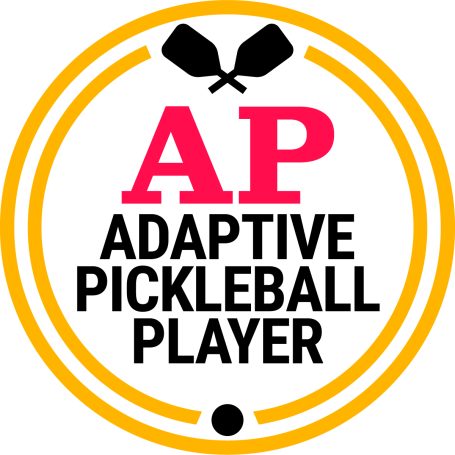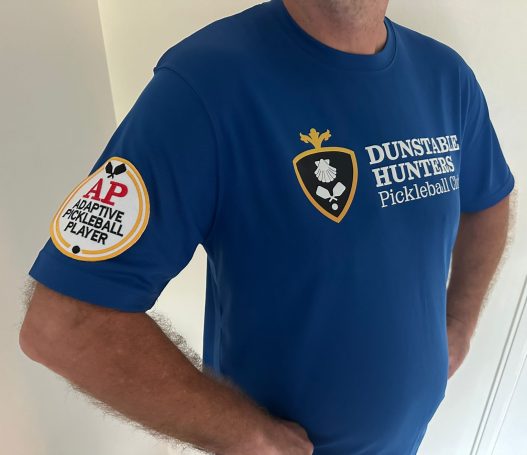Adaptive Pickleball (AP)
In Pickleball if someone has an advantage, then there are rules to level the playing field. Adaptive
Pickleball is just a few more rules to level the playing field for players with physical disabilities.
DEFINITION OF ADAPTIVE PICKLEBALL
Adaptive Pickleball is a modified version of the popular sport, pickleball, designed to make the game accessible to people with physical disabilities. It can involve using special equipment, techniques and changes to some rules to allow players with different abilities to play together.
WHY ADAPTIVE PICKLEBALL IS IMPORTANT
Adaptive Pickleball provides an opportunity for people with physical disabilities to participate in a sport that they may not have been able to before. It also promotes inclusion and understanding between players of all abilities, as well as providing a fun and active way for disabled individuals to stay fit and healthy.
WHO CAN PLAY ADAPTIVE PICKLEBALL
Anyone with a physical disability can play Adaptive Pickleball. Players can use wheelchairs, the game can also be adapted for visually impaired players by using balls with bells inside them or by having one player call out instructions during the game, deaf people can play with hand signals for the score, we shall be putting a page together for all members to read, it will be "Deaf awareness and Communication on vocabulary and numbering linking to pickleball. Currently our club doesn't have any specialist equipment, contact us to let us know there is a requirement and we will try and get funding towards the purchase of the required equipment.
PLAYING DOUBLES WITH AN ADAPTIVE PICKLEBALL PARTNER
Playing doubles with an Adaptive Pickleball partner can be challenging but also rewarding. It’s important for both players to communicate clearly about their strategies and tactics during play in order for them both to be successful. It’s also important for each player to understand their partner’s limitations so they can adjust their game accordingly. For example, if one partner has limited mobility, they may need extra time between rallies or may need assistance from their partner in getting into position quickly after each rally. With proper communication and understanding between partners, an Adaptive Pickleball player can play doubles and be just as successful as any other team on the court!
COMMUNICATION TIPS FOR PLAYING WITH AN ADAPTIVE PICKLEBALL PARTNER
Communication between partners is key when playing doubles with an Adaptive Pickleball partner. Here are some tips:
- Take turns speaking during play so that both partners have a chance to explain what they want from each other during each point
- Make sure your partner understands your plan before executing it
- Encourage your partner throughout play by providing positive feedback
- Give your partner plenty of time between rallies if needed
- Be patient when explaining strategies or tactics
- Listen carefully when your partner speaks so you understand their needs and limitations
- Don’t forget that everyone has different abilities – respect those differences!
PLAYING WITH AND/OR AGAINST AN ADAPTIVE PICKLEBALL PLAYER
At the start of the game, any Adaptive Pickleball player will inform everyone playing that they are playing Adaptive Pickleball rules. They will ask if you know these rules and if not they will explain them to you. There are only a few rules, these are listed below.
RULES FOR ADAPTIVE PICKLEBALL
The following rules shall apply in our clubs. Some rules are well known in pickleball, others may just be our own local rules because we care and want fair play:
Wheelchair users
- Players using a wheelchair are allowed the ball to bounce twice before returning it
- The second bounce can be anywhere on or off the court
- Any contact between the complete wheelchair and the ball constitutes a fault
- The front wheels of a wheelchair don't count in regards to faults, the rear wheels are to be treated in the same way as feet
- Larger court areas should be used, width and length. Unfortunately, we are limited to the size of courts at our clubs. At Dunstable the Centre court of the 3 courts shall be prioritised for wheelchair users
Lower body mobility constraints (waist downwards)
- Players with lower body mobility constraints (waist downwards) must discuss their constraint(s) with the Club Captain/Vice Captain or Club Secretary (The leaders). The leaders must agree they can play as an 'Adaptive Pickleball player'. This is usually a 2 minute chat
- Players with lower body mobility constraints (waist downwards) are allowed the ball to bounce twice before returning it
- The second bounce can be anywhere on or off the court
- Players playing Adaptive Pickleball are to make their opponents aware that they playing Adaptive Pickleball, this can be verbal or by wearing a badge, we have ours stitched on the right arm of club T-shirts. They may need to explain the different rules listed above. This will eventually educate all players in the clubs. Spread the word and respect those differences
Other physical disabilities
- Players with other physical disabilities must discuss their constraint(s) with the Club Captain/Vice Captain or Club Secretary (The leaders). The leaders must agree they can play as an 'Adaptive Pickleball player'.
This will also enable the process to start gaining funding for any special equipment required.
Adaptive Pickleball is recognised for people with physical disabilities. Sadly we are unable to find clear rules for players, other than wheelchair users. If there are rules already out there or you feel there are other rules that we can consider then please contact us and let us know. Email the club secretary here.
I HAVE PHYSICAL DISABILITIES, DO I HAVE TO PLAY ADAPTIVE PICKLEBALL
You don't have to play Adaptive Pickleball if you don't want to. If you consider your disability doesn't give you a disadvantage or you just don't agree with it, that is fine too. You are more than welcome to play the game the same as everyone else.
IS MY ANSWER FINAL
Should you ever change your mind just speak to the Club Captain/Vice Captain or Club Secretary. Players will not be able to opt in and out, per game, per week or month. This will be a lifestyle for permanent disabled players.
I HAVE A TEMPORARY DISABILITY - CAN I PLAY ADAPTIVE PICKLEBALL
Probably not, speak to your Club Captain/Vice Captain or Club Secretary for a definite answer. Broken arms, legs, twisted ankles are not reasons to play by these rules. These rules are mainly for permanent physical disabilities
WHY ARE THE CLUB CAPTAIN/VICE CAPTAIN OR CLUB SECRETARY INVOLVED
Club Captain/Vice Captain or Club Secretary run the club and will ensure your physical disabilities requires you to play as an Adaptive Pickleball player, you will not need to disclose medical records or in depth explanations, we just want to make sure people with a twisted sock aren't playing with these rules.
You will have a choice of 3 people to talk to, firstly to give you greater availability of speaking to someone without delay, secondly, to ensure you can approach either a male or female should you need to.
Adaptive Pickleball is in place to level the playing field, abuse of it will not be tolerated.
IS THIS FINAL
Our clubs have several players with clear and easy to see physical disabilities, we can clearly see the frustration on faces when a ball is played in a certain way that disadvantages them. Every other advantage in the game has a rule to level the playing field, we feel this is no different.
This is going to be new to us, like everything we do, we will do a 3 month trial. We can change things as we go, but we will give it a go for a minimum of 3 months.
Remember players with physical disabilities have to opt in to being an Adaptive Pickleball player. The only people being forced to comply will be the rest of us. Any objections can be submitted by email. Please give as full an explanation as possible and the committee will discuss it.
Our aim is for this to be a success and for other clubs and organisations to take it on board and possibly have a pickleball authority write clear and fair rules for Adaptive Pickleball players, other than wheelchair users. Fingers crossed.
For those players who will be Adaptive Pickleball players, please email your thoughts, now and as they arise in future games you play. We will need your feedback, good or bad.

